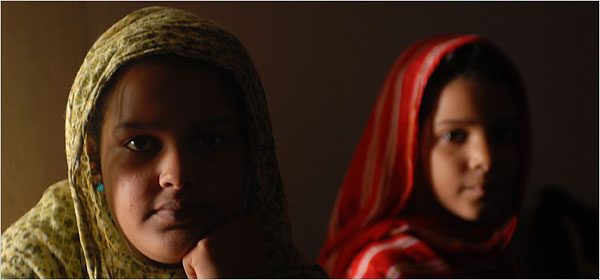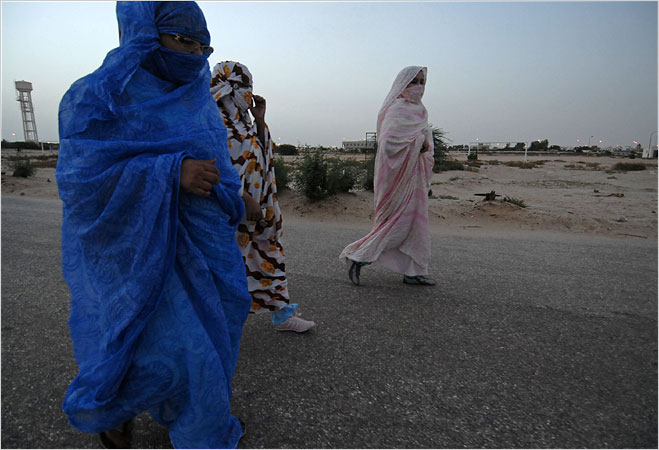NOUAKCHOTT, Mauritania — At the Olympic Sports Stadium here, a collection of dun-colored buildings rising mirage-like from the vast Sahara, about a dozen women clad in tennis shoes and sandals circled the grandstands one evening in late June, puffing with each step.
| Between pants came brief explanations for their labors.
“Because I am fat,” said one, a dark-eyed 34-year-old close to 200 pounds.
Another, a 30-year-old in bright pink sneakers, said, “For myself, for my
health and to be skinny.” It is a typically Western after-work scene. But
this is the Islamic Republic of Mauritania, the mirror opposite of the
West on questions of women’s weight. To men here, fat is sexy. And in this
patriarchal region, many Mauritanian women do everything possible — and
have everything possible done to them — to put on pounds.Now Mauritania’s
government is out to change that.
In recent years, television commercials and official pronouncements have promoted a new message: being fat leads to diabetes, heart problems, high blood pressure and other woes. The joggers outside the Olympic stadium testify to their impact: Until lately, a Mauritanian woman in jogging shoes was roughly as common as a camel in stiletto heels. |
 |
Girls as young as 5 and as old as 19 had to drink up to five gallons of fat-rich camel’s or cow’s milk daily, aiming for silvery stretch marks on their upper arms. If a girl refused or vomited, the village weight-gain specialist might squeeze her foot between sticks, pull her ear, pinch her inner thigh, bend her finger backward or force her to drink her own vomit. In extreme cases, girls died. The practice was known as gavage, a French term for force-feeding geese to obtain foie gras. “There isn’t a woman close to my age who hasn’t gone through this, maybe not with the torture, but with the milk and other things,” said Yenserha Mint Mohamed Mahmoud, 47, a top government women’s affairs official.
 |
Photo by
Candace Feit for The New York Times |
|
Nesseba, 14, left, was overfed to plump her up, but her sister Selma, 9, will be spared, says their mother, Fatma Mint Mohamed. |
Ms. Mahmoud insists that the use of torture has died out, though some say it lingers in remote areas. Still, Mauritania remains saddled with an alarming number of women weighing 220 to 330 pounds, according to the Ministry for the Promotion of Women, Family and Children.
The same 2001 survey that documented overfeeding estimated that two in five women were overweight — not high by American standards, where government surveys show nearly three in five women are overweight — but remarkable for sub-Saharan Africa. According to the International Obesity Task Force, a London-based research and advocacy group, Mauritania has the region’s fourth highest percentage of overweight women. Government officials blame a concerted effort by all but the poorest families to pump girls full of milk, cream, butter, couscous and other calorie-rich foods.
In 2003, the women’s ministry mounted a slim-down campaign, wielding messages that were anything but subtle. One television and radio skit depicted a husband carting his fat wife around in a wheelbarrow. Another featured houseguests raiding the refrigerator because their host was too obese to get up to feed them. Doctors were recruited to explain health risks.
But messages spread slowly in the desert. Nearly three-fourths of Mauritanian women do not watch television, and an even greater share do not listen to the radio, said Ms. Haidy, the statistician.
Nor is it easy, Ms. Mahmoud said, to change how the sexes view each other. “Men want women to be fat, and so they are fat,” she said. “Women want men to be skinny, and so they are skinny.” Indeed, according to Mauritanian stereotypes, porky men are womanish and lazy.
Mohamed el-Moktar Ould Salem, a 52-year-old procurement officer, blames the brightly colored, head-to-toe mulafas that hide all but the most voluptuous female curves for shaping the men’s preferences. A slender woman, he said, “just looks like a stick wrapped up.”
Fatma Mint Mohamed, 35, a mother of five living in a village south of Nouakchott, the capital, agrees. She carries nearly 200 pounds on her five-foot frame. Her weight makes her husband “very happy, of course,” she said, although her slimmer sister, 45 minutes away in the city, warns that it could kill her.
 |
|
| In Nouakchott, where the culture idealizes obesity, women answer a government call to slim down by exercising at the Olympic Sports Stadium. |
Mrs. Mohamed said she endured a comparatively mild form of gavage — “just enough so our family did not get criticized or be thought of as poor” — and was proud to emerge with a praiseworthy, roly-poly figure. Her 9-year-old daughter, Selma, with curly dark hair, wide-set eyes and what her mother considers a distressingly slim figure, has so far escaped the treatment, in hopes that she will gain weight on her own.
Selma’s sisters, now 20 and 14, were less fortunate. Mrs. Mohamed said she spared them the “old-fashioned” techniques that made girls she grew up with scream in pain. “But to tell the truth, I did take them to the cows and made them overdrink,” she acknowledged. “I did overfeed them, just a little bit, just so they could look like real Mauritanian girls. Forty days was enough to get them in the shape I wanted.”
Other Mauritanian women have replaced gavage with thoroughly modern prescription drug abuse. At the capital’s open-air market in late June last week, a male buyer easily secured a gold box of Indian-made dexamethasone tablets, a prescription steroid hormone that can cause sharp weight gain.
The black-turbaned seller, his wares displayed openly on a plastic sheet, warned that the drug was dangerous. But it would fatten up the man’s wife fast, he promised.
Nouredine François, a pharmacist, refuses to sell that drug. But he said he could not keep a particular prescription antihistamine on his shelves because women had heard it made them drowsy, thus less active and more likely to add pounds.
He considers himself one of the few Mauritanian men who understand obesity’s dangers. “Every day I see a woman come in here who has suffered from a stroke,” he said. He said he was trying to lose weight and did not push his wife to get fatter.
But his wife, an already-Rubenesque beauty-parlor worker, needs no pushing, he said. “She says, ‘Why don’t you bring me any pills? You give them to other women but you won’t give them to me.’ ”
“Women are very sensitive about their weight,” he said. “She just wants to keep up a good image.”